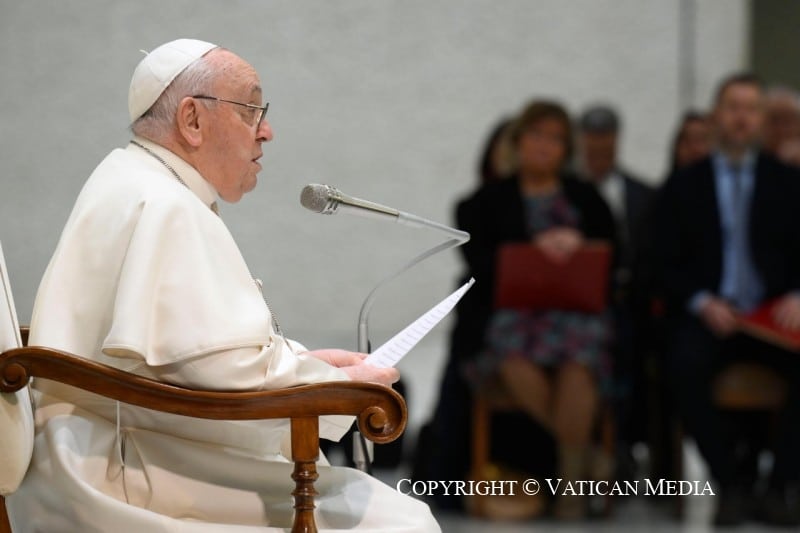“Anger destroys human relationships”
Pope's catechesis at the general audience

This morning’s General Audience took place at 9.00 in the Paul VI Hall, where the Holy Father Francis met groups of pilgrims and faithful from Italy and all over the world.
In the speech in Italian, the Pope, continuing the cycle of catechesis on “Vices and virtues”, focused his reflection on the theme of anger (Reading: Eph 4,26-27.31-32).
After summarizing his catechesis in the different languages, the Holy Father addressed particular greetings to the faithful present.
The General Audience concluded with the recitation of the Pater Noster and the Apostolic Blessing.
The following text includes parts that were not read out loud but should be considered as such.
Catechesis of the Holy Father
Cycle of Catechesis. Vices and Virtues. 6. Wrath
Dear brothers and sisters, good morning!
Today we will pause to reflect on the vice of wrath. Now we are talking about vices and virtues: today it is time to reflect on the vice of wrath. It is a particularly dark vice, and it is perhaps the easiest to detect from a physical point of view. The person dominated by wrath finds it difficult to hide this impulse: you can recognize it from the movements of his body, his aggressiveness, his laboured breathing, his grim and frowning expression.
In its most acute manifestation, wrath is a vice that concedes no respite. If it is born of an injustice suffered (or believed to be suffered), often it is unleashed not against the offender, but against the first unfortunate victim. There are men who withhold their rage in the workplace, showing themselves to be calm and composed, but at home they become unbearable for the wife and children. Wrath is a pervasive vice: it is capable of depriving us of sleep, of barring the way to reason and thought.
Wrath is a vice that destroys human relationships. It expresses the incapacity to accept the diversity of others, especially when their life choices diverge from our own. It does not stop at the misconduct of one person, but throws everything into the cauldron: it is the other person, the other as he or she is, the other as such, who provokes anger and resentment. One begins to detest the tone of their voice, their trivial everyday gestures, their ways of reasoning and feeling.
When the relationship arrives at this level of degeneration, lucidity is lost. Wrath makes us lose lucidity, doesn’t it? Because one of the characteristics of wrath, at times, is that sometimes it fails to mitigate with time. In these cases, even distance and silence, instead of easing the burden of mistakes, magnifies them. For this reason, the Apostle Paul – as we have heard – recommends to Christians to face up to the problem straight away, and to attempt reconciliation: “Do not let the sun go down on your anger” (Eph 4:26). It is important that everything dissipate immediately, before sundown. If some misunderstanding arises during the day, and two people can no longer understand each other, perceiving themselves as far apart, the night cannot be handed over to the devil. The vice would keep us awake at night, brooding over our reasons and the unaccountable mistakes that are never ours and always the other’s. It is like that: when a person is enraged, they always, always say that the other person is the problem. They are never capable of recognizing their own defects, their own shortcomings.
In the Lord’s prayer, Jesus makes us pray for our human relations, which are a minefield: a plane that is never in perfect equilibrium. In life, we have to deal with trespassers who are in fault with us, just as we have never loved everyone in the right measure. To some we have not returned the love that was due to them. We are all sinners, all of us, and we all have accounts to settle: do not forget this. We are indebted, we all have accounts to settle, and therefore we all need to learn how to forgive so as to be forgiven. Men do not stay together if they do not also practice the art of forgiveness, as far as this is humanly possible. Wrath is countered by benevolence, openness of heart, meekness and patience.
But, on the subject of wrath, there is one last thing to be said. It is a terrible vice, it was said, that is at the origin of wars and violence. The Proem of the Iliad describes the wrath of Achilles, which will be the cause of “infinite woes”. But not everything that stems from wrath is mistaken. The ancients understood well that there exists an irascible part of us that cannot and must not be denied. The passions are to some extent unconscious: they happen, they are life experiences. We are not responsible for the onset of wrath, but always for its development. And at times it is good for anger to be vented in the right way. If a person were never to anger, if a person did not become indignant at an injustice, if he did not feel something quivering in his gut at the oppression of the weak, it would mean that the person was not human, must less a Christian.
Holy indignation exists, which is not wrath but an inner movement, a holy indignation. Jesus knew it several times in His life (cf. Mk 3.5): He never responded to evil with evil, but in His soul, He felt this sentiment, and in the case of the merchants in the Temple, He performed a strong and prophetic action, dictated not by wrath, but by zeal for the house of the Lord (cf. Mt 21:12-13). We must distinguish well: zeal, holy indignation, is one thing; wrath, which is bad, is another.
It is up to us, with the help of the Holy Spirit, to find the right measure for the passions. To educate them well so that they turn to good and not to evil. Thank you.
_____________________________
Special Greetings
I greet all the English-speaking pilgrims and visitors taking part in today’s Audience, especially those coming from the United States of America. Upon all of you, and upon your families, I invoke the joy and peace of Our Lord Jesus Christ. God bless you!
______________________
Summary of the Holy Father’s words
Dear brothers and sisters: in our catechesis on the virtues and vices, we now consider “wrath”, the uncontrolled anger that may well begin with brooding over offenses received, but ends up being self-destructive and damaging to our relationships with others, leading ultimately to violence and even war. Jesus teaches us to forgive those who sin against us, while Saint Paul urges us never to let the sun set on our anger. Yet there is an appropriate kind of anger, which consists in righteous indignation before evil and injustice. As with all the passions, so too with anger: it is up to us, with the sustaining grace of the Holy Spirit, to govern and direct our emotions in order to serve God’s kingdom of reconciliation, justice and peace.
Related

Mercy and the joy of the Gospel are two key concepts of Pope Francis
Exaudi Staff
26 April, 2025
9 min

Thousands of faithful bid farewell to Pope Francis in St. Peter’s Square
Exaudi Staff
26 April, 2025
2 min

Saying Goodbye to Francis
Exaudi Staff
26 April, 2025
2 min

Pope Francis Gifts a Statue of Our Lady of Luján to Gemelli and the Catholic University of the Sacred Heart
Exaudi Staff
25 April, 2025
2 min
 (EN)
(EN)
 (ES)
(ES)
 (IT)
(IT)

